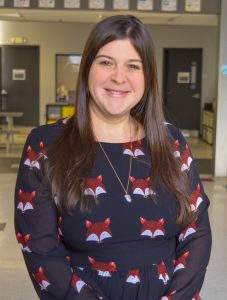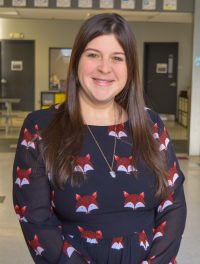Relevance and Resonance on a Spectrum of the Universal and Particular
This week’s post is by Rabbi Jessy Dressin, is the Director of Repair the World/Baltimore and community Rabbi.
I am in a transition in my rabbinate, as I have just completed a seven-year cycle as a community rabbi 
I hold to the hypothesis that Torah is timeless and that there is Torah for everything. And, I think we are often serving “big box” Judaism in an Amazon era. As I shared in an Eli Talk (2015), I believe that we are working with a different, yet rich and authentic, model for how to engage Jewishly. If the second half of the 20th century in American Jewish life mimicked the notion of “Temple Judaism,” than the onset of the 21st century invites the consideration of the “Mishkan” model, a more agile, adaptive and “take it with you” approach to Jewish community and gathering.
I consider my service to the Jewish people in the realm of Jewish engagement. In many cases, organizations and institutions that have sponsored Jewish engagement efforts – especially focused on young adult populations – have cautioned programmers to “not be too Jewish”. There seems to be a fear that if something has too much depth or chomer (content) it might “scare young people away.” I don’t believe this to be true. In fact, I challenge the notion that engagement efforts should eliminate Jewish depth because the Jewishness of an experience stands to be the unique value add that may inspire someone to choose that very option.
Consider a “main street” where your local sporting event, music concert or social activity are each placed alongside one another. Throw in a “Jewish-lite” experience to that same menu of options and it is hard to imagine anyone choosing to walk through that door. I believe that our depth – our ability to engage and provide opportunities that spark meaning– is something we should be leaning into, not shying away from. The marketing and framework that stands to pique someone’s interest is an important consideration when enticing people to show up. However, once someone walks through a doorway, it would be foolish to miss the opportunity to provide something that might inform their identity in some way. I fear that this mistake is made over and over again in Jewish engagement spaces for young adults. If we fail to provide the Jewish depth that may cause someone to reflect on the life they are living – maybe a Jacob wrestling with an angel moment – we should not be surprised that they don’t show up again.
Rabbi Sid’s essay mentioned a fictional “Bill”, who participates in an alternative break trip where he begins to access his Jewish identity and find some purpose. We know that for many volunteers, exploring Judaism is not the initial appeal for participation. An entire industry of Jewish service learning was founded on the belief that social justice and volunteering can serve as an entry point into meaningful Jewish connection. Rabbi Ed Feinstein once suggested the following idea, which has daily come up in my own teaching and presenting around Jewish identity. He said, “In the Torah, whenever there is a prerogative towards particularism, there is a nod towards universalism.” For example, peah – demarcating the corner of one’s field for those in need to come glean – is a particularly Jewish way to meet an otherwise universal truth that there are vulnerable populations in every community that need to be taken care of (the poor, the orphan, the widow for example).
This idea lends itself to both the proposition around chochma, as well as, to the important role that social justice and efforts towards tzedek in the broader community can play in shaping one’s particular understanding of their Jewishness and connections to Jewish ideas and values. The work of Repair the World is to stand at the intersection of the universal and the particular. It is possible for someone to show up because volunteering in their local community is something they value – maybe even value as a Jew. The commitment to learning and framing from a particularly Jewish vantage point serves to both reinforce that universal notion of service and to show that Judaism has much to say about contemporary issues. Such learning provides context and framing that informs how to address social issues of the day and also to deepen one’s sense of their Jewish self.
As mentioned in numerous studies, next gen folks often value full integration in the broader communities where they live. Particular identity traits can sometimes create a perception of limitation. Young people are more inclined to contribute money to organizations that have broad reach and are less likely to support organizations whose premise it to care for their own, first and foremost. For me, one of the greatest opportunities around engaging with Jewish ideas, specifically in the realm of social justice, but also more broadly, is to show just how relevant and resonant Torah ideas remain.
When we can demonstrate that the Jewish textual tradition has something to say about gender identity, systemic racism and criminal justice reform for example, we are better positioned to engage more people in working to address these issues in their home communities. It also allows us to make a case for the relevance of Judaism, something that a lot of next gen Jews may never have considered before. There is hardly a better approach to Jewish engagement than to show how Judaism has always had both universal and particular dimensions. Understanding that allows Jews to pursue their Jewish identity in a more holistic way.
Rabbi Jessy Dressin is the Director of Repair the World/Baltimore and continues to serve as a community rabbi with a unique lens to next generation behaviors and identification. She is passionate about systems change, curious about the recipe to building a sustaining and vibrant Jewish people into the future and a passionate student of Jewish tradition and contemporary landscape.


